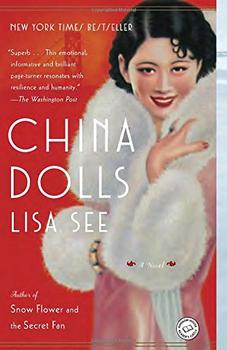Reading Guide Questions

Please be aware that this discussion guide will contain spoilers!
- The novel opens with the below quotation: "Only three things cannot be long hidden: the sun, the moon and the truth." What do you think this quotation means in the context of China Dolls? Lisa's novel is filled with secrets—some hidden and not revealed until late in the novel. What were the most important ones? Why are they hidden? Why are they secrets? Do you agree with how and when they were revealed?
- "China doll" or "China dolls" are phrases used often in the novel. What are the most important meanings behind this phrase? Which are positive? Which are negative?
- It seems as if there's a fine line between the blessings of family and the burdens of family. How is that line crossed in each girl's family? What do you think Lisa is specifically saying about mothers and fathers and their relationships with their children in China Dolls?
- Grace's father brutally abuses her when she is a young girl. Although Lisa never excuses his behavior, how does she gradually reveal to the reader some of the factors that have made him the man he is? Do you ever accept him for who he is?
- What aspects of Helen's life make her situation fundamentally different from that of the other girls? Helen's life in the compound with her family has many obvious negative aspects. Are there positive aspects to the compound as well?
- How does Grace's ambition differ from that of Ruby's?
- Is it fair to be critical of the way Joe and Ruby try to hide their early relationship from Grace? Does this betrayal ultimately help Grace in some respects?
- What important elements does Eddie bring to the novel? How would you characterize Helen's relationship with him?
- How did you react to the way Ruby seeks to hide her Japanese ancestry as WWII begins? How do you feel about her relationship with her parents? Do you think Ruby's parents are Japanese spies? Can you tell one way or another? Does it matter to you whether they are verifiably innocent or guilty?
- What personal effect does World War II have on each of the characters?
- While there are big betrayals in the novel, there are also moments of great resiliency and hope as the girls help each other and others. In what ways do Grace, Helen, and Ruby support each other?
- Grace, Helen, and Ruby face many varieties of prejudice, as well as sexism. How do their reactions differ, and how are they similar?
- Helen's narratives are filled with traditional Chinese sayings. Which are the most important in the novel and why?
- Perhaps more than in any of her other novels, Lisa has written in great detail about clothes and fashion. Why do you think she did that and what was she trying to say?
- The idea of losing face is a recurring concern in China Dolls, but the main characters tend to differ in how they understand it. For example, Grace feels that she can't comfort Ruby in her darkest hour, because she doesn't want her friend to lose face in her presence. What are some other instances where you see their differing viewpoints, and what do those moments say about each character?
- Do you think Grace's relationship with Joe is significantly different when he returns at the end of the novel? If so, how? In what ways has Grace changed? In what ways has Joe changed? Or have either of them changed?
- How is Helen's betrayal of Ruby different from her betrayal of Grace? Which betrayal is worse? Why?
- "The Darkness of Love" is the chapter title for Ruby's account of the big confrontation scene at the end of China Dolls. What do you think this phrase means in relation to this chapter? What is its importance to the novel as a whole?
- Would the final confrontation scene have been different if it had been entirely narrated by Grace? Or by Helen?
- At the end of China Dolls, Tommy's daughter Annie criticizes Grace's career as one that promoted racial stereotypes. Is this criticism fair? Why or why not?
Unless otherwise stated, this discussion guide is reprinted with the permission of Random House.
Any page references refer to a USA edition of the book, usually the trade paperback version, and may vary in other editions.

 Book Reviewed by:
Book Reviewed by:


